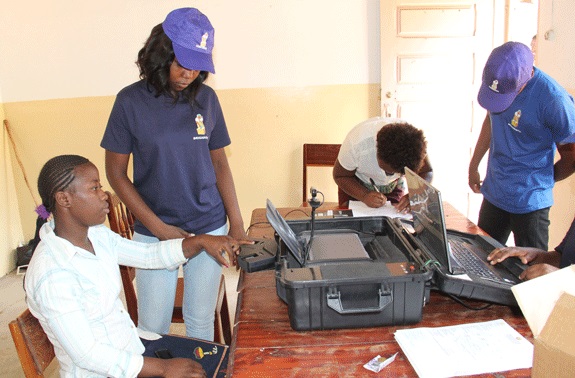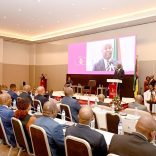Mozambique: Prime Minister calls for strategies for public communication
Electoral registration in Mozambique kicks off

File photo
Beginning this Monday (19-03) until 17 May, the voter registration process gets underway in all districts with local authorities, enabling citizens to ensure they can exercise their right to vote in the fifth municipal elections scheduled for October 10 this year, and in the sixth general election, the date of which has not yet been decided.
Voter registration has several functions. It is intended to “ensure that eligible citizens have the right to vote and prevent those who do not have such a right from exercising it; to avoid multiple votes by one elector; to facilitate voting operations; and to help prevent acts of fraud, the illegal filling of the ballot boxes”. (IESE: 2008).
Voter cards used in 2013 and 2014 are no longer valid, and citizens must re-register.
The process, which will cost 850 million meticais “not including the preparatory phase for the 10 October elections”, should have taken place from 1 March to 29 April but was rescheduled due to the second round of the Nampula by-election, held on the 14th of this month.
According to data released last week by the District Election Commission (CDE), Renamo candidate Paulo Vahanle won the contest with 58.53 percent of votes, against the 41.46 percent of Frelimo’s Amisse Cololo.
According to Technical Secretariat for Electoral Administration (STAE) spokesperson Cláudio Langa, about eight-and-a half million voters are expected to register.
Mozambique currently has 53 municipalities, in which 3,234 census count bureaux will be installed in educational establishments and temporary buildings.
Speaking to the press, last Friday (04), Langa said that 2,377 teams had been created and 7,242 census agents hired.
He explained that the number of brigades is higher in relation to the census stations because certain brigades will take care of “more than one census station”, observing a schedule previously established due to the influx of voters.
The census stations will operate from 8:00 a.m. to 6:00 p.m. every day of the week except Sundays, Good Friday, and on the April 7th and May 1st public holidays.
Langa said that the mobile ID computers, which had had problems of operation in all past processes, had been improved, and their batteries would now last eight hours.
Contrary to what National Election Commission (CNE) spokesperson Paulo Cuinica said in September last year when talking about preparations and the start of the pilot electoral census, voter cards would not be improved, Langa said.
The new plastic card, with the characteristics of a credit, has a sharper photograph and a bar code, which means it will last longer. The document which failed to materialise would also facilitate conservation and ensure greater durability, Cuinica said.
Langa claimed that the idea of introducing such a card was abandoned because of manufacturing difficulties.












Leave a Reply
Be the First to Comment!
You must be logged in to post a comment.
You must be logged in to post a comment.